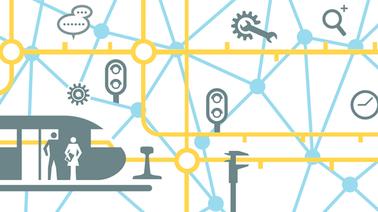MOOC List is learner-supported. When you buy through links on our site, we may earn an affiliate commission.

MOOC List is learner-supported. When you buy through links on our site, we may earn an affiliate commission.
Railway systems entail much more than a train and a track. They are based on advanced technical and operational solutions, dealing with continuously changing demands for more efficient transport for both passengers and freight every day. Each system consists of many components that must be properly integrated: from trains, tracks, stations, signaling and control systems, through monitoring, maintenance and the impact on cities, landscape and people. This integration is the big challenge and the source of many train delays, inconvenient connections and other issues that impact our society.
This engineering course attempts to tackle those issues by introducing you to a holistic approach to railway systems engineering. You will learn how the system components depend on each other to create a reliable, efficient and state-of-the-art network.
We will address questions such as:
- How do railways work and how did they evolve over time?
- What factors give rise to everyday issues?
- How do different components of the railway system interact?
- What is the effect of train stations and the network from an urban, social and economic point of view?
- What can be done to improve the monitoring and maintenance of tracks?
- How are timetables designed in a way that balances passenger demand with the capacity of the railway and is adaptable to handle unexpected disturbances?
- What can be done to prevent and deal with disturbances caused by external factors and how do they affect the whole rail system?
- How does the design of railways influence their performance over time?
A new serious game has been designed for this course to guide you through the process of decision making while building a rail network and maintaining it. Cities have to be connected in an ever-changing setting, dealing with wear, capacity, developments and disturbances. What choices do you make and how do they affect the performance of the system?
For this MOOC, our very own TU Delft Measurement Train will be used to give you insights of the track and vehicle design, real-life monitoring and pantograph/catenary interaction. Together with the game this will give you the opportunity to see real-life examples and implement the knowledge you learn in a simulated environment.
This first ever MOOC on railway systems engineering is delivered by the renowned experts of TU Delft and leading professionals working in the industry. It combines theoretical knowledge with practical examples, with the main objective to maintain a high degree of reliability under predictable and unknown circumstances.
If you want to learn about the science behind the exciting world of railway systems - whether train, metro or tram - this course will set you on the right track!
This course is offered twice a year, usually starting in April and October.
What you'll learn
- Identify the name and function of the main railway network components
- Evaluate the influence that railways exert on their environment and vice versa
- Explain the different methods of train control and their effect on timetabling and safety
- Understand the effects and the internal and external factors of disturbances on railway operations
- Identify the different methods of dealing with system degradation and the effects of interaction between the components
- Explore the state-of-the-art and future developments of railway systems
MOOC List is learner-supported. When you buy through links on our site, we may earn an affiliate commission.
MOOC List is learner-supported. When you buy through links on our site, we may earn an affiliate commission.
